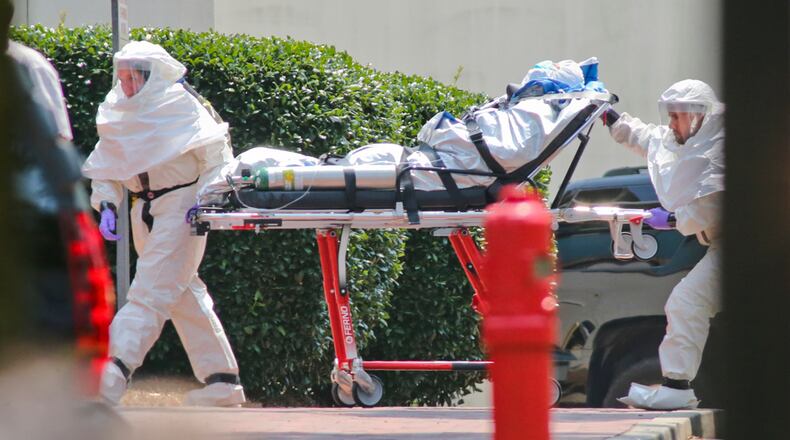Gov. Nathan Deal announced today that Georgia health officials could quarantine "high-risk" travelers from areas ravaged by Ebola even if they show no symptoms of the deadly virus.
It was part of Deal's plan to increase the state's monitoring of symptoms of Ebola for all in-bound travelers to Atlanta's busy airport from west Africa.
"We intend to be as protective of Georgia citizens as possible. But by the same token, respect the privacy of individuals who may be put in these categories," the governor said at a campaign stop in Cumming where he announced the new restrictions. "I would remind you, however, it's better to be overly cautious than not cautious at all."
The new rules were adopted by conference call by the state's newly-formed Ebola task force, made up of health experts and emergency officials, he said. The governor also ruled out compensating lost wages for those who are quarantined.
"I don't think it's right to ask the taxpayers of this state to pay for individuals who have perhaps put themselves in this category," he said. "We are incurring the expense of all the monitoring and all the quarantining that may be associated with it. I certainly don't think we need to compensate them for their lost time."
Travelers would be screened at the airport by quarantine station medical personnel, and the screening would include measuring temperature and checking for symptoms of the deadly virus, which has infected more than 10,000 in West Africa. Those showing symptoms would be isolated immediately and transferred to a hospital for evaluation.
Those who don't show any symptoms would be divided into three categories. Those deemed "high-risk" are travelers with a known direct exposure to an Ebola patient. They would be subject to a 21-day quarantine.
A second category, "low risk" travelers, include those with no known exposure to an Ebola patient. They would be required to sign a contract with state health officials that requires them to self-check their symptoms twice a day, and report back to state monitors. Those who fail to comply could be quarantined.
Medical personnel who treated Ebola patients would be put in a third category. They would be "visually monitored" - video communications or a home visit - over a 21-day period but not necessarily quarantined.
The timing of the announcement, eight days until the election, was criticized by the campaign of his Democratic challenger Jason Carter's campaign. Carter spokesman Bryan Thomas noted that Deal once said "water kills the Ebola virus." He said Deal will "do anything to make it appear he has a handle on the situation."
"Georgia's Ebola response should be driven by science, not politics," said Thomas, adding: "Georgians don't need a long memory to know that Gov. Deal doesn't handle crises well."
Deal said he the new precautions are "justified" given the potential risk to Georgia residents.
"We're going to be mindful of their privacy and their necessity to move about," he said. "But if they pose a potential threat to the citizens of the state of Georgia, we believe a quarantine is appropriate."
About the Author
The Latest
Featured




